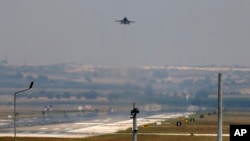The first U.S. airstrike on the Islamic State (IS) group in Syria from a base in Turkey came amid growing skepticism in Turkey and among its allies over Ankara's commitment to fighting IS. Many believe Turkey's focus remains on the Kurdish rebel group, the PKK.
After months of pressure from Washington on Ankara to open Incirlik airbase, the first U.S. drone airstrike was launched Wednesday against the IS extremists in Syria.
WATCH: One-Year Anniversary of Beginning of US Operations Against IS
In the aftermath of the suicide bombing blamed on IS last month in the Turkish town of Suruc, Ankara declared war on IS and the Kurdish rebel group PKK.
In the past week, Turkish jets have launched only three airstrikes against IS targets, compared to around an estimated 1,000 against PKK bases in Turkey and neighboring Iraq.
Nationwide arrests by security forces aimed at both groups also raise similar concern over Ankara’s priorities, says international relations expert Soli Ozel of Istanbul’s Kadir Has University.
"We are yet to see anything, except the first plane attacks, that can be considered seriously. We do not know even how many guys have been arrested. The IS guys were taken into custody, without handcuffs. The other guys were handcuffed behind their back. So it is like, 'Oh, so gently would you please come with us?' - this is not the way the police treat terrorism suspects in this country. And sooner or later this will be seen by the allies," Ozel says.
The government has refused to give figures on how many Islamic state militants have been detained out of the more than 1,400 people believed arrested in the ongoing crackdown; but, a Turkish official, speaking on condition of anonymity, said one out of six is a jihadist.
No figures have been given on those released, but some IS suspects held have been detained before only to be released after a few days, leading to allegations of a revolving door policy.
A U.N. report due in the coming weeks is expected to be critical of Turkey in its battle against jihadists, says political scientist Cengiz Aktar of Istanbul’s Suleyman Sah University.
"The Western political elite and rulers are far from being convinced that Turkey is seriously combating ISIL,” Aktar said, using another acronym for the group. “Because Turkey thinks that it can be a partner against Iran, against Syria, against Hezbollah, and this is also the strategy of Qatar and Saudi Arabia."
Meanwhile, the extent of the U.S. use of Turkey’s airbases remains unknown. Observers warn the coming weeks will be crucial for Ankara in answering growing questions over its commitment to the war against the Islamic State.






